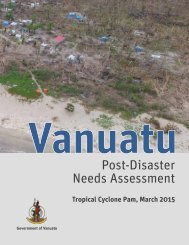Fiji
yqgk302EGjo
yqgk302EGjo
Create successful ePaper yourself
Turn your PDF publications into a flip-book with our unique Google optimized e-Paper software.
FIJI Post-Disaster Needs Assessment<br />
1.5.4 Recovery and Reconstruction Strategy and Needs<br />
Assessments of disaster effects and disaster impacts collectively assist with the determination of recovery needs under<br />
the PDNA methodology, and incorporate the concept of “building back better” (BBB). 18 The Government of <strong>Fiji</strong> has publicly<br />
reiterated the importance of BBB to avoid such effects from similar disaster events in the near future. BBB has been<br />
selectively applied across and within sectors to ensure a cost-optimized, multi-hazard reconstruction.<br />
The identified recovery needs form the basis for determining recovery, reconstruction and resilience interventions through<br />
a recovery strategy. Accordingly, the PDNA’s main goal is to assist governments in assessing the full extent of a disaster’s<br />
impact on the country and, on the basis of these findings, to produce an actionable and sustainable recovery strategy for<br />
mobilizing financial and technical resources.<br />
Financial requirements for recovery and reconstruction are estimated as a function of the values of destroyed assets,<br />
changes in the flows of the economy, and the decline in personal or household income, obtained in the assessment of<br />
disaster effects, as follows.<br />
<br />
<br />
<br />
equivalent to the amounts of working capital required by producers to achieve recovery of production levels. The<br />
needs for recovery in the services sectors (education, health, culture, transport, communications, electricity, and<br />
water and sanitation) are the amounts required to restore supply to, and access by, the population. The estimation<br />
of personal or household income decline, arising from the previously estimated drop in production at sectoral<br />
levels, is used to determine the possible financial requirements for “cash-for-work” and other income-assistance<br />
programmes for the affected population. Recovery needs typically have a value that is equivalent to a fraction of the<br />
value of estimated losses in sectoral production combined with higher costs of production.<br />
<br />
to incorporate an additional cost for improved, disaster-resilient standards, which adhere to the principles of BBB.<br />
Reconstruction needs are usually slightly higher than the estimated value of damage or destruction of assets, as<br />
rebuilding will include the introduction of disaster-resilient design and construction standards.<br />
For both recovery and reconstruction needs, the value of any existing insurance proceeds should be deducted.<br />
1.5.5 Specific Context of this PDNA<br />
The geographical context of this PDNA covers all four divisions of <strong>Fiji</strong> (Central, Eastern, Northern and Western), as all were<br />
impacted by TC Winston. Annex 9: Map of <strong>Fiji</strong> provides a map of <strong>Fiji</strong> that clearly shows all the divisions.<br />
1.5.6 Limitations of this Assessment<br />
This assessment was completed 65 days after TC Winston, and reports only on data received at the time of writing.<br />
Undertaking field surveys was hindered due to flooding and the threat of TC Zena during 6-7 April 2016. This had some<br />
impact on the collection of damage and loss data, particularly for the commerce and manufacturing sector.<br />
18<br />
BBB is a reconstruction approach that seeks to reduce vulnerability and improve living conditions, while promoting more effective<br />
and sustainable reconstruction. It uses the opportunity of having to rebuild following a disaster event to examine the suitability and<br />
sustainability of reconstruction activities.<br />
Tropical Cyclone Winston, February 20, 2016<br />
23



